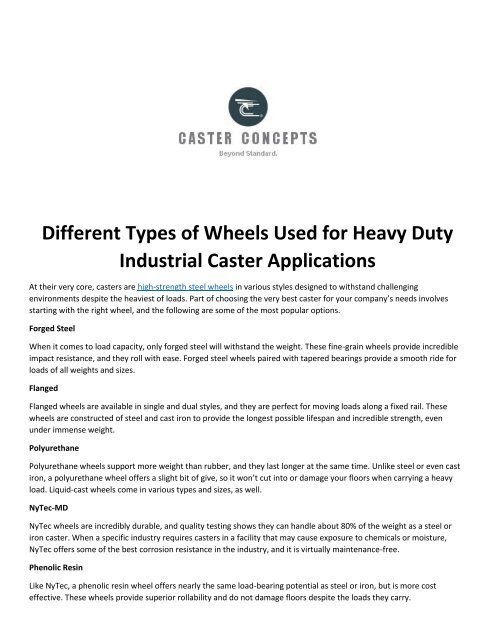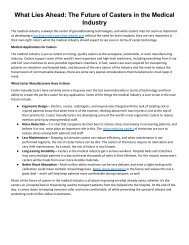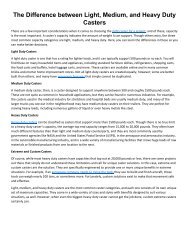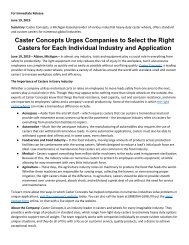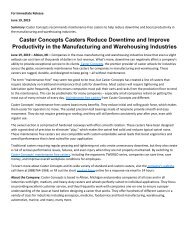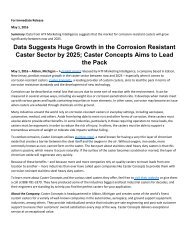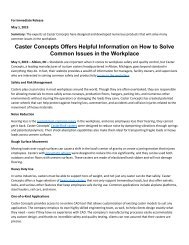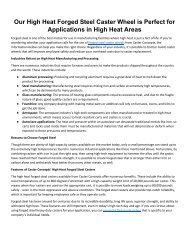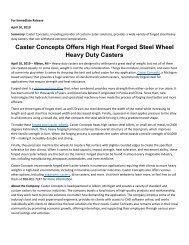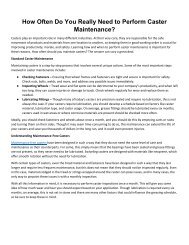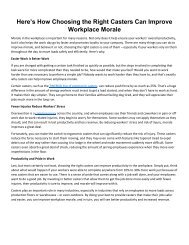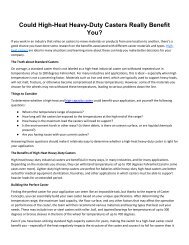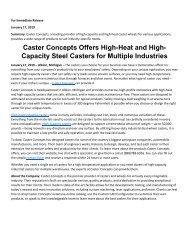Different Types of Wheels Used for Heavy Duty Industrial Caster Applications
At their very core, casters are high-strength steel wheels in various styles designed to withstand challenging environments despite the heaviest of loads. Part of choosing the very best caster for your company’s needs involves starting with the right wheel, and the following are some of the most popular options. Visit: https://www.casterconcepts.com/casters/
At their very core, casters are high-strength steel wheels in various styles designed to withstand challenging environments despite the heaviest of loads. Part of choosing the very best caster for your company’s needs involves starting with the right wheel, and the following are some of the most popular options. Visit: https://www.casterconcepts.com/casters/
Create successful ePaper yourself
Turn your PDF publications into a flip-book with our unique Google optimized e-Paper software.
<strong>Different</strong> <strong>Types</strong> <strong>of</strong> <strong>Wheels</strong> <strong>Used</strong> <strong>for</strong> <strong>Heavy</strong> <strong>Duty</strong><br />
<strong>Industrial</strong> <strong>Caster</strong> <strong>Applications</strong><br />
At their very core, casters are high-strength steel wheels in various styles designed to withstand challenging<br />
environments despite the heaviest <strong>of</strong> loads. Part <strong>of</strong> choosing the very best caster <strong>for</strong> your company’s needs involves<br />
starting with the right wheel, and the following are some <strong>of</strong> the most popular options.<br />
Forged Steel<br />
When it comes to load capacity, only <strong>for</strong>ged steel will withstand the weight. These fine-grain wheels provide incredible<br />
impact resistance, and they roll with ease. Forged steel wheels paired with tapered bearings provide a smooth ride <strong>for</strong><br />
loads <strong>of</strong> all weights and sizes.<br />
Flanged<br />
Flanged wheels are available in single and dual styles, and they are perfect <strong>for</strong> moving loads along a fixed rail. These<br />
wheels are constructed <strong>of</strong> steel and cast iron to provide the longest possible lifespan and incredible strength, even<br />
under immense weight.<br />
Polyurethane<br />
Polyurethane wheels support more weight than rubber, and they last longer at the same time. Unlike steel or even cast<br />
iron, a polyurethane wheel <strong>of</strong>fers a slight bit <strong>of</strong> give, so it won’t cut into or damage your floors when carrying a heavy<br />
load. Liquid-cast wheels come in various types and sizes, as well.<br />
NyTec-MD<br />
NyTec wheels are incredibly durable, and quality testing shows they can handle about 80% <strong>of</strong> the weight as a steel or<br />
iron caster. When a specific industry requires casters in a facility that may cause exposure to chemicals or moisture,<br />
NyTec <strong>of</strong>fers some <strong>of</strong> the best corrosion resistance in the industry, and it is virtually maintenance-free.<br />
Phenolic Resin<br />
Like NyTec, a phenolic resin wheel <strong>of</strong>fers nearly the same load-bearing potential as steel or iron, but is more cost<br />
effective. These wheels provide superior rollability and do not damage floors despite the loads they carry.
Pneumatic<br />
For situations in which shock absorption is important to load movement safety, a pneumatic wheel is a phenomenal<br />
option. These wheels <strong>of</strong>fer more absorption and cushioning than many <strong>of</strong> their counterparts, but no spring is required.<br />
This makes pneumatic wheels a cost-effective alternative to spring-loaded casters, but it should be noted that loadbearing<br />
capabilities are a bit more limited since the wheel is quite a bit s<strong>of</strong>ter than other types.<br />
Cast & Ductile Iron<br />
Cast iron wheels are designed <strong>for</strong> applications when high heat is a factor, such as in a foundry. These are made from<br />
Class 30 gray iron which is durable and complete with heavy-duty cross sections. Ductile iron wheels are much like cast<br />
iron, but is stronger to resist chipping and breaking.<br />
Drive & Keyway<br />
Drive and keyway wheels are designed to work with computerized drive systems and come in a variety <strong>of</strong> shapes and<br />
sizes. They range in diameter from 3” to 18” and also come in several unique bore sizes to suit all applications.<br />
The perfect caster starts with the perfect wheel, and as you can see, different wheels are better suited <strong>for</strong> certain<br />
applications. Learning more about the qualities and benefits <strong>of</strong> each wheel type can help you make better decisions<br />
about your unique needs.


